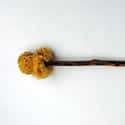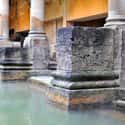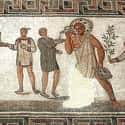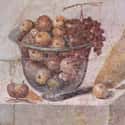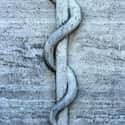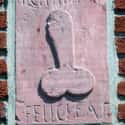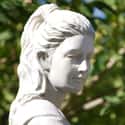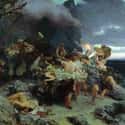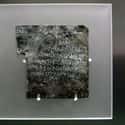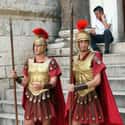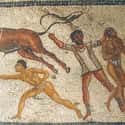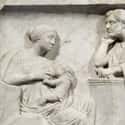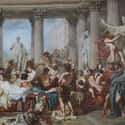-
(#1) Forget Toilet Paper; They Had Sponge On A Stick
Ancient Romans used a particularly gross form of cleaning to keep their whitest togas white. To really clean those hard to reach places after they spent some time squatted down over a bench with holes in it, they would wipe with a sponge set on the end of a stick. Called a xylospongium, these sponge-sticks were attached to the bathroom benches, so a busy Roman didn't have to worry about toting one through the city with them as they ran daily errands.
To access the stick, you'd reach through a keyhole and maneuver it through to clean your derriere. Although this sounds like a convenient, time-saving trick, it's pretty hideous that people using public restrooms likely had to share sponge-sticks. All one can hope is that they were switched out or cleaned often by bathroom attendants.
-
(#2) Poor Sanitation Caused Lots Of Illness And Parasites
Ancient Rome had a pretty sophisticated sewer system, but it's purpose – rather than to remove excrement, and general filth – was to drain standing water from the streets. Ancient Romans had very different cleanliness standards than more contemporary civilizations, and they just weren't that concerned about poop and rotting food in the streets as long as they could walk through them. However, examining Roman excrement has revealed how absolutely awful these standards were for people at the time. In fact, archaeologists have found tons of parasites and infections in fossilized Roman poop, including roundworm and dysentery.
In addition, the Romans, frugal people that they were, didn't dispose of a lot of the excrement they had access to. Instead they used it to fertilize their crops, which recycled their bowels back onto their food. And their version of ketchup, a favorite condiment, was an uncooked, fermented fish sauce called garum. This beloved solution might have allowed tapeworm parasites to thrive.
-
(#3) They Washed Their Clothes With Urine
Here's the ancient version of a dry cleaner: a fuller, who used urine to clean clothes. It sounds disgusting, but ammonia, a key ingredient in human-made water, is great at getting tricky stains out of togas. And, unlike soap, it was easy to acquire. Fullers could just put vessels on street corners, and men who needed to pass water could contribute their services by using into the buckets.
The first-century Roman emperor Vespasian famously instated a "urine tax," raking in a bunch of cash by taxing the public bins where people dumped urine collected from toilets. And the tax was quite lucrative. Some even credit it with saving the Empire at a particularly precarious time. When Vespasian's son, the future emperor Titus, expressed his displeasure at this governmental initiative, his dad "held a piece of money from the first payment to his son's nose, asking whether its odor was offensive to him," according to Suetonius. Titus, of course, said no, and Vespasian famously replied, "Yet it comes from urine!"
-
(#4) The Empire Was Built By Millions Of Slaves
Rome wasn't built in a day, but it was built on the backs – and with the hands of – a magnitude of slaves. In fact, one of the city's foundational myths is the story of the capture of the Sabine women, who were taken from their community and forced to become reproductive machines for the creation and continuance of the Roman population.
Whether bought in markets, seized from nearby communities, or captured as a result of foreign wars, servi (as the slaves were called in Latin) were estimated to have made up anywhere from one-third to three-fifths of Italy's entire population. That means there were up to four million slaves in Italy alone, which doesn't even count the rest of the Empire!
-
(#5) A Nice Dinner Consisted Of Pig's Womb, Mashed Brains, And Stuffed Dormice
Ancient Rome had quite the...unique and vibrant foodie culture. Thanks to a gentleman gourmand named Apicius, who took it upon himself to eat and record recipes from around the Empire, there exists a detailed list of some of Ancient Rome's favorite recipes in the form of a cookbook. Spayed sow's womb, when prepared with "pepper, celery seed, dry mint, laser root, honey, vinegar and broth," was a particular favorite. As was the "paunch of a suckling pig" when filled with "pieces of pork pounded in the mortar, three brains — the nerves removed" and mixed with raw eggs. For those looking for a lighter snack, stuffed dormouse casserole was a go-to!
-
(#6) Camel Brains And Animal Dung Were Considered Cure-Alls
Getting sick in imperial Rome? You might well have had to swallow some animal dung. In his Natural History, Pliny writes that "a camel's brain, dried and taken in vinegar, cures epilepsy," while "the ash of the burnt dung makes the hair curl." But not just camel, as goat excrement was proven to be useful. Pliny says that an "application also of she-goat's dung boiled down in vinegar was an approved treatment for snake bite, and so is the ash of fresh dung boiled down in wine." Tortoise dung was excellent for curing abscesses, while holding rabbit dung convinced dogs not to bark at you.
-
(#7) Their Graffiti And Poetry Were Really Dirty
As far as disgusting facts about Rome go, this one isn't so unusual: Romans loved a good dirty joke. The town of Pompeii, in particular, boasted tons of dirty graffiti scrawled on public walls and in private bars alike. You could be strolling down a lane and be confronted with phrases like "Restituta, take off your tunic, please, and show us your privates." Other drawings featured erect phalloi, images that, while obviously sexual, were also thought to ward off disease and illness (virility penises, get it?).
And the naughty sayings also appeared in poems. In Catullus's famously dirty "Poem 16," he called his friend Aurelius a phallus-sucker and his pal Furius a "little b**ch."
-
(#8) Pre-Pubescent Girls Were Forced Into Marriages
Young ladies in ancient Rome didn't have it easy when it came to marriage. Not only were their unions (particularly the aristocratic ones) usually arranged, but some of the girls also hadn't even hit puberty at the time of their marriages. In fact, many Roman girls were married off at age 14 or before. The first emperor of Rome, Augustus, was probably the person who solidified the minimum legal ages of wedded bliss at 12 for girls and an elderly 14 for boys. For those peasants lucky enough not to be members of the upper class, weddings were permitted as late as their twenties.
-
(#9) Emperors Were Notoriously Depraved In Their Personal Lives
The second emperor, Tiberius, had a villa in Capri where he organized bacchanals, put together a lewd library, and trained young boys to "tease him with their licks and nibbles," according to Suetonius.
Emperor Caligula wasn't much better. It was widely rumored that he had relations with his sisters. As if that wasn't enough, Caligula himself spread a rumor that his mother, Agrippina, was the result of his grandfather Augustus coupling with his own daughter Julia.
-
(#10) Transgressors Were Drowned In Sacks With Animals Or Entombed While Alive
Perhaps the most famous method of punishment in ancient Rome was crucifixion, but there's so much more where that came from. In fact, there's a veritable trove of unsettling punishments that the Romans enjoyed dolling out because of their spectacular nature.
For example, an offender might also be eaten by wild beasts or burned alive in retribution for the wrongs they committed. If someone did something really serious – like killing their own father – they might be sewn into a sack with a rooster, a dog, a monkey, and a snake, then thrown into the Tiber River to drown alive. Vestal Virgins, traditionally chaste priestesses, were entombed alive if they broke their vows of purity.
-
(#11) They Removed Their Rivals Using Deplorable Methods
Romans loved to off their competitors, using whatever means necessary to get the job done. Augustus's stepson, the general Germanicus, was allegedly "cursed" (the malediction was written down on a lead tablet and entombed in his house). Lead tablets pierced with nails were a preferred method of cursing since this tactic was thought to bring about the desired effect in the form of a legal agreement with the gods to do harm to a person.
Toxic plants and tainted food was another common means of removing someone you didn't like in imperial Rome. A whole host of emperors were allegedly guilty of offing people they hated, including their own relatives and rivals to their throne.
-
(#12) Roman Soldiers And Emperors Slayed In Bulk
The Roman army, during both the Republican and Imperial periods, decimated opposing armies and Average Joes alike, removing whoever got in the way of areas they were looking to conquer. And the Romans eliminated in bulk.
Statistics vary depending on the account, but the second-century sack of Seleucia, a Mesopotamian city, involved "burning down" a community of 300,000. Later, the emperor Maxentius exterminated thousands of his fellow senators in order to take their property and wives, and some estimate that the emperor Tiberius slaying more than 35,000 during his reign.
-
(#13) Thousands Of Animals And Gladiators Perished In Games
Men didn't just fight one another in the gladiatorial games; they also fought wild beasts that were imported from all over the empire. With no PETA around to defend them, these exotic animals were caged in dismal conditions and then unleashed to ravage their human rivals. In Emperor Trajan's games held between 108-109 C.E. alone, 10,000 gladiators and 11,000 animals were slaughtered (although some think chroniclers' numbers were exaggerated). In another festive celebration, 8,000 animals were slain in 80 C.E. to christen Titus's new amphitheater.
-
(#14) Ancient Romans Bathed With Oil, Then Reused It For Future Baths
When it was time for a bath, ancient Romans headed for a public bath house. Here, they would progress through a series of rooms: the scalding hot caldarium, then the lukewarm tepidarium, then finally the icy frigidarium. Before bathing, Romans would coat their skin in olive oil, then scrape it off (or have their slaves scrape it off) with a strigil. This was supposed to remove dirt, dead skin, and perspiration. And what would happen with the dirty oil? It would be reused for the next guest, or even used for women to condition their hair.
-
(#15) Ancient Birth Control Was Weird And Dangerous (But Sometimes Effective)
Giving birth in ancient Rome was extremely dangerous for both mother and baby. Infections, hemorrhaging, and other complications were unfortunately common.
Not interested in taking your chances on childbirth? Birth control options were available, but they were strange, to say the least. According to the physicians Soranus,
It also aids in preventing conception to smear the orifice of the uterus all over before with olive oil or honey or cedar resin or juice of the balsam tree, alone or together with white lead; or with a moist cerate containing myrtle oil and white lead; or before the act with moist alum, or with galbanum together with wine; or to put a lock of fine wool into the orifice of the uterus...
Many of these methods were possibly effective (since they served to blocked access to the uterus.)
-
(#16) Dinner Parties Took Place In Piles Of Shells And Animal Bones
While the existence of "vomitoriums" where Romans would intentionally purge themselves is a merely a myth, dinner parties were still pretty gross by modern standards. At elite parties, guests would eat while reclining on sofas, where they'd just toss animal bones, skins, seafood shells, olive pits, and any other refuse on the ground for slaves to clean up.
New Random Displays Display All By Ranking
About This Tool
In the era of extremely poor health and medical conditions, the disgusting life of the ancient Romans may be beyond your imagination. In ancient Rome, urine was a big business, and the government even set a special tax on urine sales. There were people who make a living by selling urine. Some of them go to public toilets to collect urine, while others collect urine from house to house. You must not guess what they did with urine. Ancient Romans washed clothes with urine.
It is certain that urine was not the most disgusting daily life in ancient Rome. The random tool shares 16 gross details of daily life in ancient Rome that will shock you.
Our data comes from Ranker, If you want to participate in the ranking of items displayed on this page, please click here.











